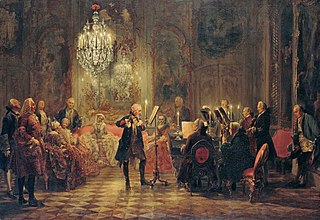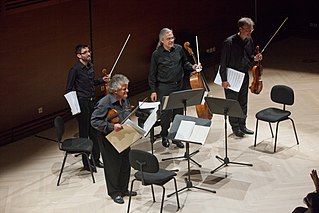Related Research Articles
In music, a quartet or quartette is an ensemble of four singers or instrumental performers; or a musical composition for four voices and instruments.

The term string quartet can refer to either a type of musical composition or a group of four people who play them. Many composers from the mid-18th century onwards wrote string quartets. The associated musical ensemble consists of two violinists, a violist, and a cellist.

Chamber music is a form of classical music that is composed for a small group of instruments—traditionally a group that could fit in a palace chamber or a large room. Most broadly, it includes any art music that is performed by a small number of performers, with one performer to a part. However, by convention, it usually does not include solo instrument performances.

A barbershop quartet is a group of four singers who sing music in the barbershop style, characterized by four-part harmony without instrumental accompaniment, or a cappella. The four voices are: the lead, the vocal part which typically carries the melody; a bass, the part which provides the bass line to the melody; a tenor, the part which harmonizes above the lead; and a baritone, the part that frequently completes the chord. The baritone normally sings just below the lead singer, sometimes just above as the harmony requires. Barbershop music is typified by close harmony— the upper three voices generally remain within one octave of each other.

Milton Byron Babbitt was an American composer, music theorist, mathematician, and teacher. He is particularly noted for his serial and electronic music.

The Amadeus Quartet was a string quartet founded in 1947 and disbanded in 1987, having retained its founding members throughout its history.

The Arditti Quartet is a string quartet founded in 1974 and led by the British violinist Irvine Arditti. The quartet is a globally recognized promoter of contemporary classical music and has a reputation for having a very wide repertoire. They first became known taking into their repertoire technically challenging pieces. Over the years, there have been personnel changes but Irvine Arditti is still at the helm, leading the group. The repertoire of the group is mostly music from the last 50 years with a strong emphasis on living composers. Their aim from the beginning has been to collaborate with composers during the rehearsal process. However, unlike some other groups, it is loyal to music of a classical vein and avoids cross-genre music. The Quartet has performed in major concert halls and cultural festivals all over the world and has the longest discography of any group of its type. In 1999, it won the Ernst von Siemens Music Prize for lifetime achievement, being the first and only group to date to receive this award.

The Modern Jazz Quartet (MJQ) was a jazz combo established in 1952 that played music influenced by classical, cool jazz, blues and bebop. For most of its history the Quartet consisted of John Lewis (piano), Milt Jackson (vibraphone), Percy Heath, and Connie Kay (drums). The group grew out of the rhythm section of Dizzy Gillespie's big band from 1946 to 1948, which consisted of Lewis and Jackson along with bassist Ray Brown and drummer Kenny Clarke. They recorded as the Milt Jackson Quartet in 1951 and Brown left the group, being replaced on bass by Heath. During the early-to-mid-1950s they became the Modern Jazz Quartet, Lewis became the group's musical director, and they made several recordings with Prestige Records, including the original versions of their two best-known compositions, Lewis's "Django" and Jackson's "Bags' Groove". Clarke left the group in 1955 and was replaced as drummer by Connie Kay, and in 1956 they moved to Atlantic Records and made their first tour to Europe.

The Kronos Quartet is an American string quartet based in San Francisco. It has been in existence with a rotating membership of musicians for almost 50 years. The quartet covers a very broad range of musical genres, including contemporary classical music. More than 900 works have been written for it.

Barbershop vocal harmony, as codified during the barbershop revival era (1930s–present), is a style of a cappella close harmony, or unaccompanied vocal music, characterized by consonant four-part chords for every melody note in a primarily homorhythmic texture. Each of the four parts has its own role: generally, the lead sings the melody, the tenor harmonizes above the melody, the bass sings the lowest harmonizing notes, and the baritone completes the chord, usually below the lead. The melody is not usually sung by the tenor or baritone, except for an infrequent note or two to avoid awkward voice leading, in tags or codas, or when some appropriate embellishment can be created. One characteristic feature of barbershop harmony is the use of what is known as "snakes" and "swipes". This is when a chord is altered by a change in one or more non-melodic voices. Occasional passages may be sung by fewer than four voice parts.

The Guarneri Quartet was an American string quartet founded in 1964 at the Marlboro Music School and Festival. It was admired for its rich, warm, complex tone and its bold, dramatic interpretations of the quartet literature, with a particular affinity for the works of Beethoven and Bartók. Through teaching at Harpur College, University of Maryland, Curtis Institute of Music, and at Marlboro, the Guarneri players helped nurture interest in quartet playing for a generation of young musicians. The group's extensive touring and recording activities, coupled with its outreach efforts to engage audiences, contributed to the rapid growth in the popularity of chamber music during the 1970s and 1980s. The quartet is notable for its longevity: the group performed for 45 years with only one personnel change, when cellist David Soyer retired in 2001 and was replaced by his student Peter Wiley. The Guarneri Quartet disbanded in 2009.
A tetralogy, also known as a quadrilogy, is a compound work that is made up of four distinct works. The name comes from the Attic theater, in which a tetralogy was a group of three tragedies followed by a satyr play, all by one author, to be played in one sitting at the Dionysia as part of a competition.

Ludwig van Beethoven's late string quartets are:
SATB is an initialism that describes the scoring of compositions for choirs, and also choirs of instruments. The initials are for the voice types: S for soprano, A for alto, T for tenor and B for bass.

The Paganini Quartet was an American string quartet founded by cellist Robert Maas and violinist Henri Temianka in 1946. The quartet drew its name from the fact that all four of its instruments, made by Antonio Stradivari (1644–1737), had once been owned by the great Italian violinist and composer Niccolo Paganini (1782–1840).
F major is a major scale based on F, with the pitches F, G, A, B♭, C, D, and E. Its key signature has one flat. Its relative minor is D minor and its parallel minor is F minor.

"Million Dollar Quartet" is a recording of an impromptu jam session involving Elvis Presley, Jerry Lee Lewis, Carl Perkins, and Johnny Cash made on December 4, 1956, at the Sun Record Studios in Memphis, Tennessee. An article about the session was published in the Memphis Press-Scimitar under the title "Million Dollar Quartet". The recording was first released in Europe in 1981 as The Million Dollar Quartet with 17 tracks. A few years later more tracks were discovered and released as The Complete Million Dollar Session. In 1990, the recordings were released in the United States as Elvis Presley: The Million Dollar Quartet. This session is considered a seminal moment in rock and roll.
The St. Lawrence String Quartet is a Canadian string quartet, and one of Canada's premier chamber ensembles.

Four Quartets is a set of four poems written by T. S. Eliot that were published over a six-year period. The first poem, Burnt Norton, was published with a collection of his early works. After a few years, Eliot composed the other three poems, East Coker, The Dry Salvages, and Little Gidding, which were written during World War II and the air-raids on Great Britain. They were first published as a series by Faber and Faber in Great Britain between 1940 and 1942 towards the end of Eliot's poetic career. The poems were not collected until Eliot's New York publisher printed them together in 1943.